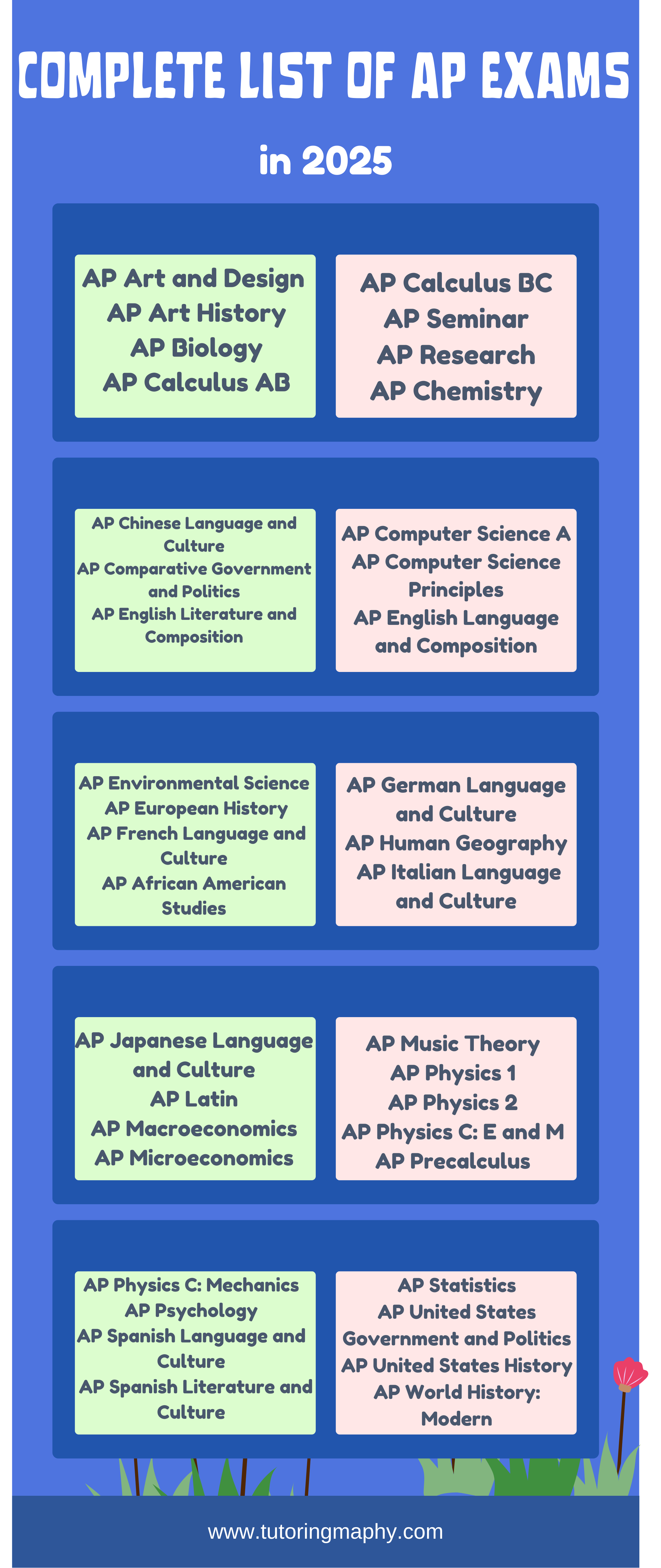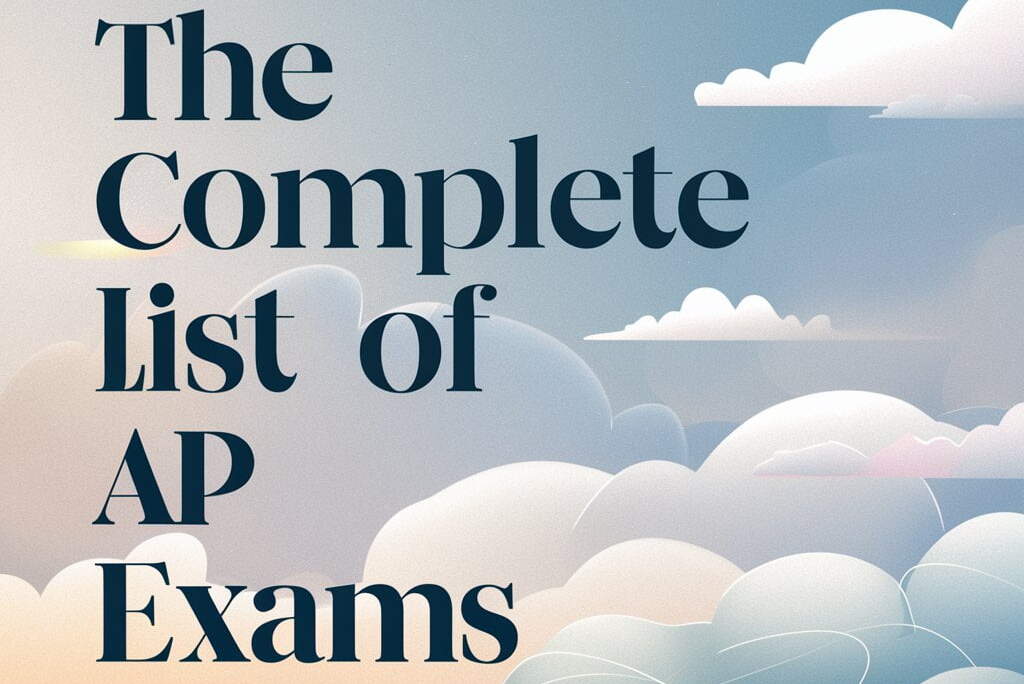Introduction
AP exams are standardized exams in the United States created by the College Board. They offer high school students the opportunity to take college-level courses and earn college credit if they perform well. The significance of these exams can’t be overstated, as they provide a pathway for ambitious students to stand out in college admissions, save on tuition fees, and gain advanced knowledge in subjects of interest. Moreover, the rigorous preparation for these exams helps students develop strong study habits and a deeper understanding of the subjects they are passionate about.
AP Exam Overview for 2025
Changes and Updates for 2025
The AP exams for 2025 have seen a few updates. The College Board continually refines the curriculum and exam structure to ensure they reflect the latest academic standards and best practices in education. It’s essential for students and educators to stay informed about these changes to prepare effectively. For instance, the introduction of new course materials and changes in exam formats can influence study strategies and resource selection.
How are AP Exams Structured
Each AP exam typically includes a multiple-choice section and a free-response section, testing both breadth and depth of knowledge. The scoring scale ranges from 1 to 5, with a score of 3 or higher often considered passing and eligible for college credit. Understanding the format and types of questions asked can greatly enhance a student’s performance, as it allows for more targeted and effective preparation. Let’s explore the complete list of AP exams available in 2025
Subject-Specific AP Exams
A. AP Capstone
- AP Seminar : This course develops students’ skills in research, analysis, evidence-based arguments, collaboration, writing, and presenting. It encourages students to investigate real-world issues from multiple perspectives.
- AP Research : Following AP Seminar, AP Research allows students to conduct a year-long research project on a topic of their choice, culminating in a 4,000-5,000 word academic paper and a presentation.
B. Arts
- AP Art and Design (Drawing, 2-D Art and Design, 3-D Art and Design) : Students submit portfolios of their work, showcasing their artistic skills, creativity, and personal style. These courses emphasize both technical skill and innovative expression.
- AP Art History : This course covers art from prehistoric times to the present, exploring themes, styles, and historical contexts. Students learn to analyze and interpret works of art critically.
- AP Music Theory : AP Music Theory develops students’ understanding of music composition and theory. It covers topics like harmony, melody, rhythm, and form, preparing students for advanced music study.
C. English
- AP English Language and Composition : Focusing on rhetoric and effective communication, this course teaches students to analyze and compose various types of texts, honing their writing and critical reading skills.
- AP English Literature and Composition : Students study and interpret literature from various periods and genres, developing skills in literary analysis, critical thinking, and essay writing.
D. History and Social Sciences
- AP Comparative Government and Politics : This course examines political systems, institutions, and processes in different countries, nurturing a deeper understanding of global political dynamics.
- AP European History : AP European History covers European history from the Renaissance to the present, exploring key events, movements, and figures that shaped the continent.
- AP Human Geography : Students learn about patterns and processes that shape human understanding, use, and alteration of Earth’s surface, including topics like population, culture, and urban development.
- AP Macroeconomics : This course introduces principles of economics that apply to the economy as a whole, including topics like inflation, unemployment, and economic growth.
- AP Microeconomics : AP Microeconomics focuses on the economic principles that apply to individual decision-makers, including concepts like supply and demand, market structures, and consumer behavior.
- AP Psychology : Students explore the scientific study of behavior and mental processes, covering topics such as development, cognition, and personality.
- AP United States Government and Politics : This course provides an analytical perspective on government and politics in the United States, covering constitutional principles, political beliefs, and policy-making processes.
- AP United States History : AP US History covers American history from pre-Columbian times to the present, emphasizing critical events, movements, and figures.
- AP World History (Modern) : This course examines world history from 1200 CE to the present, focusing on global processes, contacts, and interactions between societies.
- AP African American Studies Exam : The AP African American Studies exam explores the historical, cultural, and societal contributions of African Americans. It covers a wide range of topics including key historical events, significant figures, and cultural movements. The exam is designed to provide students with a deep understanding of African American history and its impact on society.
E. Math and Computer Science
- AP Precalculus : AP Precalculus prepares students for advanced math courses like calculus, covering functions, complex numbers, and trigonometry. It’s a valuable course for building strong mathematical foundations.
- AP Calculus AB : AP Calculus AB covers differential and integral calculus, providing a foundation for advanced study in mathematics and related fields.
- AP Calculus BC : Building on Calculus AB, AP Calculus BC covers additional topics like sequences and series, offering a more comprehensive calculus education.
- AP Computer Science A : This course introduces students to computer programming using Java, emphasizing problem-solving and algorithm development.
- AP Computer Science Principles : AP Computer Science Principles offers a broader introduction to computing, covering topics like algorithms, data analysis, and the societal impact of computing.
- AP Statistics : AP Statistics introduces students to the principles of statistics, including data collection, analysis, and interpretation, preparing them for further study in various fields.
Check this out to know about the AP Calculus AB vs BC
F. Sciences
- AP Biology : AP Biology covers a wide range of topics, including evolution, cellular processes, genetics, and ecology, providing a strong foundation in biological sciences.
- AP Chemistry : Students in AP Chemistry study the structure and properties of matter, chemical reactions, and thermodynamics, among other topics, preparing for college-level chemistry.
- AP Environmental Science : This course explores the interrelationships of the natural world, addressing topics like ecosystems, biodiversity, and environmental issues.
- AP Physics 1 (Algebra-Based) : AP Physics 1 covers fundamental physics concepts using algebra, including topics like kinematics, dynamics, and energy. Taking AP Calculus AB and AP Physics 1 together is a pretty popular choice.
- AP Physics 2 (Algebra-Based) : Building on Physics 1, this course covers additional topics like fluid mechanics, thermodynamics, and electromagnetism.
- AP Physics C (Electricity and Magnetism) : AP Physics C Electricity and Magnetism is calculus-based course focuses on electricity and magnetism, providing a rigorous foundation for students interested in engineering and physical sciences.
- AP Physics C (Mechanics) : Also calculus-based, AP Physics C Mechanics topics like motion, force, and energy, preparing students for advanced physics study.
Interested to know further about AP Physics C? Check out All about AP Physics C Exam
Already decided which AP Physics you are taking? We have all the reads for you:
How to Study for AP Physics 1 Exam in 2025
AP Physics C mechanics: Key points you need to know
Succeeding in AP Physics C Electricity and Magnetism
G. World Languages and Cultures
- AP Chinese Language and Culture : Students develop proficiency in Mandarin Chinese and gain insight into Chinese culture, preparing for advanced language study and cultural understanding.
- AP French Language and Culture : This course emphasizes communication in French and understanding of Francophone cultures, preparing students for further language study.
- AP German Language and Culture : Students enhance their German language skills and cultural knowledge, preparing for advanced study and international opportunities.
- AP Italian Language and Culture : This course develops Italian language proficiency and cultural understanding, promoting a deeper appreciation for Italy’s heritage.
- AP Japanese Language and Culture : Students improve their Japanese language skills and cultural knowledge, preparing for further study and global opportunities.
- AP Latin : AP Latin focuses on translating and interpreting Latin texts, enhancing students’ understanding of ancient Roman literature and culture.
- AP Spanish Language and Culture : Students develop proficiency in Spanish and gain insight into Hispanic cultures, preparing for advanced language study.
- AP Spanish Literature and Culture : This course explores Spanish and Latin American literature, emphasizing literary analysis and cultural context.
What are the most hard AP Exams? Read our series of blogs Most Difficult AP Exams Part 1 and Part 2

Conclusion
The Benefits of Taking AP Exams
AP exams offer numerous benefits, including college credit, advanced placement, and improved college applications. They also help students develop critical thinking, time management, and subject-specific skills. Moreover, the rigorous preparation for these exams helps students develop strong study habits and a deeper understanding of the subjects they are passionate about. Additionally, taking AP courses and exams can significantly boost a student’s confidence and readiness for college-level coursework. The skills gained through these exams are not only beneficial academically but also essential for personal growth and lifelong learning.
Learn more about How are AP and College credits related?
Final Thoughts and Encouragement
Taking AP exams can be challenging but rewarding. With dedication and the right resources, students can achieve great success. Remember, the journey through AP courses and exams is as valuable as the destination. Embrace the challenges, celebrate the milestones, and keep pushing forward. The hard work and preparation will pay off in college and beyond. Your hard work and perseverance will undoubtedly lead to success, both in college and in your future career. Best of luck to all AP students in 2025. Stay motivated, stay focused, and make the most of this opportunity to excel.
Interested to know how long are these AP exams? Read AP Exam Length: How long are AP exams?
Frequently Asked Questions (FAQs)
Q. How many AP exams are there?
As of 2025, there are 38 AP exams available for students to take. These exams span a wide range of subjects, including the arts, English, history and social sciences, math and computer science, sciences, and world languages and cultures. The variety ensures that students can find exams that match their interests and academic strengths. Taking multiple AP exams can demonstrate a student’s versatility and readiness for college-level coursework.
How many APs would make the cut? Find out the sweet spot on How many AP Classes should you take?
Q. How many questions are on the AP Biology exam?
The AP Biology exam is designed to test a student’s understanding of biological principles and their ability to apply these concepts. The exam consists of two main sections:
Section I: Multiple-Choice Questions (MCQs)
60 questions
This section lasts 90 minutes and counts for 50% of the exam score. The questions cover a wide range of topics, including molecular biology, genetics, evolution, and ecology. Students must not only recall facts but also interpret data and analyze experimental results.
Section II: Free-Response Questions (FRQs)
6 questions
This section lasts 90 minutes and counts for the other 50% of the exam score. It includes two long free-response questions and four short free-response questions. The long questions typically involve analyzing experimental data and designing experiments, while the short questions may involve interpreting graphs, making calculations, and explaining biological concepts.
Q. How many questions are on the AP Calculus AB exam?
The AP Calculus AB exam assesses a student’s understanding of fundamental concepts in calculus, including limits, derivatives, integrals, and the Fundamental Theorem of Calculus. The exam is divided into two sections:
Section I: Multiple-Choice Questions (MCQs)
45 questions
This section is 105 minutes long and accounts for 50% of the exam score. It is divided into two parts: one part allows the use of a calculator (30 questions), and the other part does not (15 questions). Students are tested on their ability to solve problems, understand calculus concepts, and apply these concepts to real-world scenarios.
Section II: Free-Response Questions (FRQs)
6 question
This section is 90 minutes long and also accounts for 50% of the exam score. It includes one part that allows the use of a calculator (2 questions) and one part that does not (4 questions). The free-response questions require students to demonstrate their understanding through detailed solutions and explanations, often involving multiple steps and justifications.
Check out this detailed blog on Breaking Down AP Calculus AB : Comprehensive Overview
Q. How many questions are on the AP Calculus BC exam?
The AP Calculus BC exam covers all the topics in Calculus AB, as well as additional concepts such as parametric, polar, and vector functions, and series. The structure of the exam is similar to that of the Calculus AB exam but includes more advanced material:
Section I: Multiple-Choice Questions (MCQs)
45 questions
This section is 105 minutes long and makes up 50% of the exam score. It is split into two parts: one allowing the use of a calculator (30 questions) and one without a calculator (15 questions). The questions test students’ knowledge and application of a broader range of calculus topics, requiring both computational and analytical skills.
Section II: Free-Response Questions (FRQs)
6 questions
This section lasts 90 minutes and also accounts for 50% of the exam score. It includes two parts: one part that permits the use of a calculator (2 questions) and one part that does not (4 questions). The free-response questions require in-depth solutions and often involve complex problems that integrate multiple calculus concepts, including those unique to the BC curriculum.
Check out this detailed blog on Everything You Need to Know About AP Calculus BC
Are you also planning to take Digital SAT? Read all about the New Digital SAT Format



